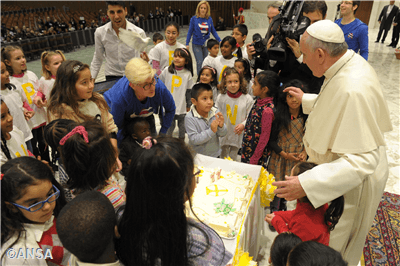Chris Blosser launches an interesting dialogue between two prevalent attitudes toward Islam: that it is a violent, totalitarian ideology or that it is a religion and culture riven by internal conflict that can be approached through dialogue.
Chris contrasts the proponents of the two different views, naming author Robert Spencer as a leading advocate of the former and Pope Benedict as a proponent of the latter.
Billing itself as “an examination of Islam, Violence, and the Fate of the Non-Muslim World,” the authors of Islam: What the West Needs to Know intend to challenge the erroneous notion that “Islam is a peaceful religion and that those who commit violence in its name are fanatics who misinterpret its tenets,” insisting rather that “Islam is a violent, expansionary ideology that seeks the destruction or subjugation of other faiths, cultures, and systems of government.”
{…}
Needless to say, this perception — a reduction of Islam to little more than a violent, totalitarian ideology — regards dialogue with Muslims, and the prospects of reform within Islam itself, with utmost skepticism. One only has to carry this line of thinking to its ultimate conclusions to understand why:
If it is indeed the case that Muslims are “locked in perpetual combat” if it is “incumbent on Muslims” to subvert and ultimately assimilate the West, any attempt to dialogue would not only be pointless, it would be delusional.
Against this he contrasts Pope Benedict’s several statements on Islam, including from before his pontificate, which recognize the propensity for violence in Muslim societies, but also see common cause in the Islamic rejection of Western moral decay and decadence. It is a fact that the Vatican’s most common ally in the United Nations against radical social engineering has been Muslims countries along with a very few Catholic ones.
Christians and Muslims, we must face together the many challenges of our time. There is no room for apathy and disengagement, and even less for partiality and sectarianism. We must not yield to fear or pessimism. Rather, we must cultivate optimism and hope.
Interreligious and intercultural dialogue between Christians and Muslims cannot be reduced to an optional extra. It is in fact a vital necessity, on which in large measure our future depends. […]
I pray with all my heart, dear and esteemed Muslim friends, that the merciful and compassionate God may protect you, bless you and enlighten you always.
I’m not so sure I think there’s a clear dichotomy between the viewpoints. One could say that Islam is dominated by a violent totalitarian ideology, that such views are espoused by many of its leaders, and that its foundational principles created a clear path toward such views even as we acknowledge that there are many Muslims who reject that ideology, who wish to live in peace, who practice peace. The question then becomes which attitude is more true to the essence of Islam and even if it’s not the violent ideology has it come to indelibly dominate the religion?
Technorati Tags: Vatican | Catholic | Pope | Islam | dialogue |





Anyone who has paid attention to what Pope Benedict has said about Islam knows that, when he speaks of “dialogue,” it is not the same as when loopy pacifists use the term. He knows that, although there are elements of truth in Islam, just as there are elements of truth in many non-Christian things, because Allah is not bound by reason, Islam itself is too susceptible of irrationality. And without reason and rational thought, dialogue is pointless.
The pacifist’s idea of dialogue is “You’re OK, I’m OK, let’s hold hands and sing and dance and be friends.” Benedict’s idea of dialogue is not to accept and celebrate the other side in an atmosphere of relativistic truth, but to appreciate the areas of agreement, and then to prod and encourage conversion of the other side to the truth. This is especially necessary if the other side is not passive in its error, but uses its error to cause violence and death.
To a large extent, Spencer sees Islam as so inherently dangerous that it must be fought against, if not destroyed. I’m not so sure that Benedict takes the opposite view. He too thinks that Islam needs to be changed—that is, in its present form it needs to be destroyed. The difference is that Spencer is in favor of using guns and economics to do the job, seeing it in purely worldly terms, while Benedict is in favor of using reason and words to do the job, seeing the battle in spiritual, as well as worldly terms.
Do not overlook the fact that the radical Islam being preached and fometned around the world is funded by Saudi Arabian oil money in a devilish bargain with Saudi radicals. Were it not for this artificial boost for the worst kind of Imam radicalism, there would be much greater opportunity for dialogue because the voices of the millions of more-or-less Muslims could be heard.
When the world’s dependence on oil ends—within, say, 50 years—the Middle East again will be a deserved backwater and the phenomenon of worldwide funding of radical Islam will end.